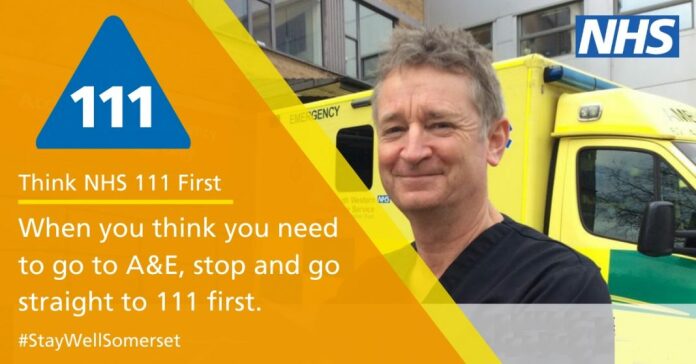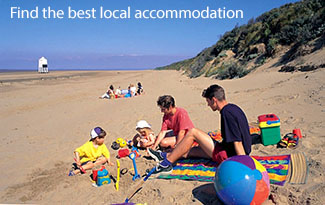A new system has been introduced for people in Somerset who need urgent, but not emergency care.
People will be urged to contact NHS 111 by phone or online, at any time of day or night, to get medical advice and care.
Emergency calls for serious or life-threatening illnesses or injuries should still call 999.
If needed, experienced clinicians will make a referral directly to GP surgeries, Emergency Departments (A&E) Minor Injury Units and other urgent care services.
In line with the Think 111 First national campaign, the new system in Somerset aims to encourage people to contact 111, before attending A&E. This will help to ensure that people can safely receive the right care, in the most appropriate setting, whilst relieving pressure on hospital emergency departments.
Dr Helen Thomas, Clinical lead for Urgent and Emergency care at Somerset Clincial Commissioning Group (CCG), explained “We want to ensure that people can access the right care, in the right place and at the right time. If people have an urgent, but non-life threatening medical need – by contacting 111 first, we can provide medical advice and assessment quickly.”
“Trained medical professionals will advise people on the most appropriate healthcare service for their medical needs. This could include medical advice over the phone, through a minor injury unit, local pharmacy, or contacting their GP Surgery. If you need urgent care and an Emergency Department or a minor injury unit is the right place for you, we will book you in to be seen quickly and safely with a time slot.”
“The new system will help more people to benefit from early clinical assessment over the phone, or online and will support the NHS to manage the flow of patients when capacity in waiting rooms is much smaller than before, to maintain distancing and reduce the risk of infection.”
Dr James Gagg, ED Consultant and Clinical Director for Integrated & Urgent Care at Somerset NHS Foundation Trust, adds: “We know it can often be difficult to know where to go for urgent medical treatment or advice. When you think you need to go to the emergency department, we are asking people to stop and contact 111 first; clinicians will be will be able to advise you on where to go, or what to do next and to book a time to attend at that service if appropriate.”
“We have put in place new and important measures to keep everyone as safe as possible
when you access care and as a result of vital social distancing measures, we have less space available to us in hospital waiting rooms. Contacting 111 before visiting a hospital will also help us to keep everyone safe.”
Arrangements have not changed for people with serious or life-threatening illnesses or injuries. Please continue to dial 999, as before. To contact 111 – just call 111, or click: 111.nhs.uk/
How will NHS 111 in Somerset operate?
Anyone phoning 111 in Somerset will have their details taken by a NHS trained call-handler
and asked an important set of initial questions, to ensure that an emergency response (for
serious or life-threatening illness or injury) is not required and to gather key information.
If a clinical opinion is needed, the call-handler then passes all the information to the Somerset Clinical Assessment Service (CAS). These are experienced senior clinicians with local knowledge, who are able to offer informed advice and/or refer the patient to the most-appropriate clinical setting.
Clinicians will call the patient back to discuss where to go or what to do next. If patients need urgent, but not emergency care a defined time slot will be provided for the patient to attend – either within a Minor Injury Unit or A&E at Musgrove Park Hospital, or Yeovil District Hospital.
People with urgent healthcare needs may also be directed to local pharmacies if appropriate.
The online version of NHS 111 works in the same way. Users will be required to complete the initial ‘safety’ questions, which will then trigger a call-back from a senior clinician in the CAS if needed.
This new approach allows people to be referred into a wider range of services providing urgent care, including:
- Local minor injury units
- Local out-of-hours GP treatment centres
- Pharmacies
- The nearest ED
Following the clinical assessment, patients with non-urgent medical needs may also be
advised to visit their local community pharmacy, contact their GP surgery, or self-care options.
NHS 111 has access to the full directory of services, including opening hours for each unit, so people are sent to the right place.
Clinical advisers will increasingly be able to book patients directly into units or, where this is
not possible, send through details to the unit so staff know the patient is coming.
Watch a video here for more details.







